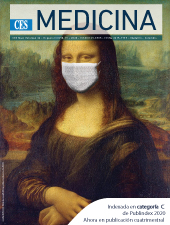Inteligencia Emocional y practica clínica en tiempos de pandemia
DOI:
https://doi.org/10.21615/cesmedicina.34.COVID-19.9Palabras clave:
Inteligencia emocional, Burnout, Profesional de la salud, Pandemia, COVID-19Resumen
Los cambios generados por la pandemia COVID-19 han significado innumerables retos en la práctica clínica, en los que el personal de salud ha tenido que adaptarse profesional y emocionalmente. Fortalecer la inteligencia emocional en los profesionales de la salud contribuye a su bienestar personal, previene el síndrome de burnout y ayuda a la creación de ambientes laborales seguros, objetivos fundamentales a la hora de enfrentar desafíos como la pandemia actual. Cuatro habilidades de la inteligencia emocional que son particularmente importantes en la práctica clínica (autoconciencia, autorregulación, conciencia social y manejo de relaciones) son objeto de reflexión en el presente artículo.
Descargas
Referencias bibliográficas
Liu Q, Luo D, Haase JE, Guo Q, Wang XQ, Liu S, et al. The experiences of health-care providers during the COVID-19 crisis in China: a qualitative study. Lancet Glob Heal [Internet]. 2020 Apr; Available from: https://linkinghub.elsevier.com/retrieve/pii/S2214109X20302047
Lai J, Ma S, Wang Y, Cai Z, Hu J, Wei N, et al. Factors Associated With Mental Health Outcomes Among Health Care Workers Exposed to Coronavirus Disease 2019. JAMA Netw Open [Internet]. 2020 Mar 23;3 (3):e203976. Available from: https://jamanetwork.com/journals/jamanetworkopen/fullarticle/2763229
Kang L, Li Y, Hu S, Chen M, Yang C, Yang BX, et al. The mental health of medical workers in Wuhan, China dealing with the 2019 novel coronavirus. The Lancet Psychiatry [Internet]. 2020 Mar 1 [cited 2020 May 5];7 (3):e14. Available from: http://www.ncbi.nlm.nih.gov/pubmed/32035030
Hall LH, Johnson J, Watt I, Tsipa A, O’Connor DB. Healthcare Staff Wellbeing, Burnout, and Patient Safety: A Systematic Review. Harris F, editor. PLoS One [Internet]. 2016 Jul 8;11 (7):e0159015. Available from: https://dx.plos.org/10.1371/journal.pone.0159015
Maunder R, Lancee W, Balderson K, Bennett J, Borgundvaag B, Evans S, et al. Long-term Psychological and Occupational Effects of Providing Hospital Healthcare during SARS Outbreak. Emerg Infect Dis [Internet]. 2006;12 (12):1924–32. Available from: http://wwwnc.cdc.gov/eid/article/12/12/06-0584_article.htm
Salovey P, Mayer JD. Emotional Intelligence. Imagin Cogn Pers [Internet]. 1990 Mar 28;9 (3):185–211. Available from: http://journals.sagepub.com/doi/10.2190/DUGG-P24E-52WK-6CDG
Mayer JD, Salovey P, Caruso DR. Emotional intelligence: New ability or eclectic traits? Am Psychol [Internet]. 2008;63 (6):503–17. Available from: http://doi.apa.org/getdoi.cfm?doi=10.1037/0003-066X.63.6.503
Bar-On R. The Bar-On model of emotional-social intelligence (ESI). Psicothema [Internet]. 2006;18 Suppl:13–25. Available from: http://www.ncbi.nlm.nih.gov/pubmed/17295953
Goleman D. What makes a leader? Harv Bus Rev [Internet]. 76 (6):93–102. Avail able from: http://www.ncbi.nlm.nih.gov/pubmed/10187249
Mintz LJ, Stoller JK. A Systematic Review of Physician Leadership and Emotional Intelligence. J Grad Med Educ [Internet]. 2014 Mar;6 (1):21–31. Available from: http://www.jgme.org/doi/abs/10.4300/JGME-D-13-00012.1
Mayer JD, Salovey P. The intelligence of emotional intelligence. Intelligence [Internet]. 1993 Oct;17 (4):433–42. Available from: https://linkinghub.elsevier.com/retrieve/pii/0160289693900103
Mayer JD, Salovey P, Caruso DR, Sitarenios G. Measuring emotional intelligence with the MSCEIT V2.0. Emotion [Internet]. 2003;3 (1):97–105. Available from: http://doi.apa.org/getdoi.cfm?doi=10.1037/1528-3542.3.1.97
O’Connor PJ, Hill A, Kaya M, Martin B. The Measurement of Emotional Intelligence: A Critical Review of the Literature and Recommendations for Researchers and Practitioners. Front Psychol [Internet]. 2019 May 28;10. Available from: https://www.frontiersin.org/article/10.3389/fpsyg.2019.01116/full
World Health Organization. International classification of diseases for mortality and morbidity statistics (11th Revision). [Internet]. 2018. Available from: https://icd.who.int/browse11/l-m/
Maslach C, Leiter MP. Understanding the burnout experience: recent research and its implications for psychiatry. World Psychiatry [Internet]. 2016 Jun;15 (2):103–11. Available from: http://doi.wiley.com/10.1002/wps.20311
Birks YF, Watt IS. Emotional intelligence and patient-centred care. J R Soc Med [Internet]. 2007 Aug;100 (8):368–74. Available from: http://www.ncbi.nlm.nih.gov/pubmed/17682030
Dewa CS, Loong D, Bonato S, Thanh NX, Jacobs P. How does burnout affect physician productivity? A systematic literature review. BMC Health Serv Res [Internet]. 2014 Dec 28;14 (1):325. Available from: https://bmchealthservres.biomedcentral.com/articles/10.1186/1472-6963-14-325
Weng H-C. Does the physician’s emotional intelligence matter? Impacts of the physician’s emotional intelligence on the trust, patient-physician relationship, and satisfaction. Health Care Manage Rev [Internet]. 33 (4):280–8. Available from: http://www.ncbi.nlm.nih.gov/pubmed/18815493
Rotenstein LS, Torre M, Ramos MA, Rosales RC, Guille C, Sen S, et al. Prevalence of Burnout Among Physicians. JAMA [Internet]. 2018 Sep 18;320 (11):1131. Available from: http://jama.jamanetwork.com/article.aspx?doi=10.1001/jama.2018.12777
IsHak WW, Lederer S, Mandili C, Nikravesh R, Seligman L, Vasa M, et al. Burnout During Residency Training: A Literature Review. J Grad Med Educ [Internet]. 2009 Dec;1 (2):236–42. Available from: http://www.jgme.org/doi/abs/10.4300/JGME-D-09-00054.1
Bulmer Smith K, Profetto-McGrath J, Cummings GG. Emotional intelligence and nursing: an integrative literature review. Int J Nurs Stud [Internet]. 2009 Dec;46 (12):1624–36. Available from: http://www.ncbi.nlm.nih.gov/pubmed/19596323
Shahid R, Stirling J, Adams W. Promoting wellness and stress management in residents through emotional intelligence training. Adv Med Educ Pract [Internet]. 2018 Sep;Volume 9:681–6. Available from: https://www.dovepress.com/promoting-wellness-and-stress-management-in-residents-through-emotiona-peer-reviewed-article-AMEP
Lin DT, Liebert CA, Tran J, Lau JN, Salles A. Emotional Intelligence as a Predictor of Resident Well-Being. J Am Coll Surg [Internet]. 2016 Aug;223 (2):352–8. Available from: https://linkinghub.elsevier.com/retrieve/pii/S1072751516301429
Kozlowski D, Hutchinson M, Hurley J, Rowley J, Sutherland J. The role of emotion in clinical decision making: an integrative literature review. BMC Med Educ [Internet]. 2017 Dec 15;17 (1):255. Available from: https://bmcmededuc.biomedcentral.com/articles/10.1186/s12909-017-1089-7
Lerner JS, Li Y, Valdesolo P, Kassam KS. Emotion and Decision Making. Annu Rev Psychol [Internet]. 2015 Jan 3;66 (1):799–823. Available from: http://www.annualreviews.org/doi/10.1146/annurev-psych-010213-115043
Garfinkel SN, Zorab E, Navaratnam N, Engels M, Mallorquí-Bagué N, Minati L, et al. Anger in brain and body: the neural and physiological perturbation of decision-making by emotion. Soc Cogn Affect Neurosci [Internet]. 2016 Jan 1;11 (1):150–8. Available from: https://academic.oup.com/scan/article/11/1/150/2375178
Fallowfield L, Jenkins V. Communicating sad, bad, and difficult news in medicine. Lancet [Internet]. 2004 Jan;363 (9405):312–9. Available from: https://linkinghub.elsevier.com/retrieve/pii/S0140673603153925
Heyhoe J, Birks Y, Harrison R, O’Hara JK, Cracknell A, Lawton R. The role of emotion in patient safety: Are we brave enough to scratch beneath the surface? J R Soc Med [Internet]. 2016 Feb 18;109 (2):52–8. Available from: http://journals.sagepub.com/doi/10.1177/0141076815620614
Díaz-Castrillón CE, Cortés N, Rey S, Pineda M, Díaz-Castrillón JF, Sierra Tobón S. Percepción de la Pandemia COVID-19 en los Servicios de Cirugía en Colombia. Rev Colomb Cirugía [Internet]. 2020 May 11;35 (2):290–301. Available from: https://www.revistacirugia.org/index.php/cirugia/article/view/655
Barrett LF, Gross J, Christensen TC, Benvenuto M. Knowing what you’re feeling and knowing what to do about it: Mapping the relation between emotion differentiation and emotion regulation. Cogn Emot [Internet]. 2001 Nov;15 (6):713–24. Available from: http://www.tandfonline.com/doi/abs/10.1080/02699930143000239
Lieberman MD, Eisenberger NI, Crockett MJ, Tom SM, Pfeifer JH, Way BM. Putting feelings into words: affect labeling disrupts amygdala activity in response to affective stimuli. Psychol Sci [Internet]. 2007 May;18 (5):421–8. Available from: http://www.ncbi.nlm.nih.gov/pubmed/17576282
Fessell D, Cherniss C. Coronavirus Disease 2019 (COVID-19) and Beyond: Micropractices for Burnout Prevention and Emotional Wellness. J Am Coll Radiol [Internet]. 2020 Mar; Available from: https://linkinghub.elsevier.com/retrieve/pii/S1546144020302908
Melita Prati L, Douglas C, Ferris GR, Ammeter AP, Buckley MR. EMOTIONAL INTELLIGENCE, LEADERSHIP EFFECTIVENESS, AND TEAM OUTCOMES. Int J Organ Anal [Internet]. 2003 Jan;11 (1):21–40. Available from: https://www.emerald.com/insight/content/doi/10.1108/eb028961/full/html
Beauregard M, Lévesque J, Bourgouin P. Neural Correlates of Conscious Self-Regulation of Emotion. J Neurosci [Internet]. 2001 Sep 15;21 (18):RC165–RC165. Available from: http://www.jneurosci.org/lookup/doi/10.1523/JNEUROSCI.21-18-j0001.2001
Gupta R, Koscik TR, Bechara A, Tranel D. The amygdala and decision-making. Neuropsychologia [Internet]. 2011 Mar;49 (4):760–6. Available from: https://linkinghub.elsevier.com/retrieve/pii/S0028393210004197
Arch JJ, Craske MG. Mechanisms of mindfulness: Emotion regulation following a focused breathing induction. Behav Res Ther [Internet]. 2006 Dec;44 (12):1849–58. Available from: https://linkinghub.elsevier.com/retrieve/pii/S0005796705002743
Shafir T, Tsachor RP, Welch KB. Emotion Regulation through Movement: Unique Sets of Movement Characteristics are Associated with and Enhance Basic Emotions. Front Psychol [Internet]. 2016 Jan 11;6. Available from: http://journal.frontiersin.org/Article/10.3389/fpsyg.2015.02030/abstract
Saarikallio S. Music as emotional self-regulation throughout adulthood. Psychol Music [Internet]. 2011 Jul;39 (3):307–27. Available from: http://journals.sagepub.com/doi/10.1177/0305735610374894
Wood W, Rünger D. Psychology of Habit. Annu Rev Psychol [Internet]. 2016 Jan 4;67 (1):289–314. Available from: http://www.annualreviews.org/doi/10.1146/annurev-psych-122414-033417
Brennan EJ. Towards resilience and wellbeing in nurses. Br J Nurs [Internet]. 2017 Jan 12;26 (1):43–7. Available from: http://www.magonlinelibrary.com/doi/10.12968/bjon.2017.26.1.43
Jun J, Tucker S, Melnyk BM. Clinician Mental Health and Well‐Being During Global Healthcare Crises: Evidence Learned From Prior Epidemics for COVID‐19 Pandemic. Worldviews Evidence-Based Nurs [Internet]. 2020 Jun 22;17 (3):182–4. Available from: https://onlinelibrary.wiley.com/doi/abs/10.1111/wvn.12439
Skinner C, Spurgeon P. Valuing empathy and emotional intelligence in health leadership: a study of empathy, leadership behaviour and outcome effectiveness. Heal Serv Manag Res [Internet]. 2005 Feb 21;18 (1):1–12. Available from: http://journals.sagepub.com/doi/10.1258/0951484053051924
Hojat M, Louis DZ, Markham FW, Wender R, Rabinowitz C, Gonnella JS. Physiciansʼ Empathy and Clinical Outcomes for Diabetic Patients. Acad Med [Internet]. 2011 Mar;86 (3):359–64. Available from: http://journals.lww.com/00001888-201103000-00026
MORRISON J. The relationship between emotional intelligence competencies and preferred conflict-handling styles. J Nurs Manag [Internet]. 2008 Nov;16 (8):974–83. Available from: http://doi.wiley.com/10.1111/j.1365-2834.2008.00876.x
Halpern J. What is clinical empathy? J Gen Intern Med [Internet]. 2003 Aug;18 (8):670–4. Available from: http://link.springer.com/10.1046/j.1525-1497.2003.21017.x
Lyndon A, Zlatnik MG, Wachter RM. Effective physician-nurse communication: a patient safety essential for labor and delivery. Am J Obstet Gynecol [Internet]. 2011 Aug;205 (2):91–6. Available from: https://linkinghub.elsevier.com/retrieve/pii/S0002937811004686
Prezerakos PE. Nurse Managers’ Emotional Intelligence and Effective Leadership: A Review of the Current Evidence. Open Nurs J [Internet]. 2018 May 31;12 (1):86–92. Available from: https://opennursingjournal.com/VOLUME/12/PAGE/86/
Dias-Barbosa C, Balp, Kulich K, Germain N, Rofail D. A literature review to explore the link between treatment satisfaction and adherence, compliance, and persistence. Patient Prefer Adherence [Internet]. 2012 Jan;39. Available from: http://www.dovepress.com/a-literature-review-to-explore-the-link-between-treatment-satisfaction-peer-reviewed-article-PPA
Lotfi M, Hamblin MR, Rezaei N. COVID-19: Transmission, prevention, and potential therapeutic opportunities. Clin Chim Acta [Internet]. 2020 Sep;508:254–66. Available from: https://linkinghub.elsevier.com/retrieve/pii/S0009898120302503
Descargas
Publicado
Cómo citar
Número
Sección
Licencia
Derechos de autor 2020 CES Medicina

Esta obra está bajo una licencia internacional Creative Commons Atribución-NoComercial-CompartirIgual 4.0.
Derechos de reproducción (copyright)
Cada manuscrito se acompañará de una declaración en la que se especifique que los materiales son inéditos, que no han sido publicados anteriormente en formato impreso o electrónico y que no se presentarán a ningún otro medio antes de conocer la decisión de la revista. En todo caso, cualquier publicación anterior, sea en forma impresa o electrónica, deberá darse a conocer a la redacción por escrito.
Plagios, duplicaciones totales o parciales, traduccones del original a otro idioma son de responsabilidad exclusiva de los autores el envío.
Los autores adjuntarán una declaración firmada indicando que, si el manuscrito se acepta para su publicación, los derechos de reproducción son propiedad exclusiva de la Revista CES Medicina.
Se solicita a los autores que proporcionen la información completa acerca de cualquier beca o subvención recibida de una entidad comercial u otro grupo con intereses privados, u otro organismo, para costear parcial o totalmente el trabajo en que se basa el artículo.
Los autores tienen la responsabilidad de obtener los permisos necesarios para reproducir cualquier material protegido por derechos de reproducción. El manuscrito se acompañará de la carta original que otorgue ese permiso y en ella debe especificarse con exactitud el número del cuadro o figura o el texto exacto que se citará y cómo se usará, así como la referencia bibliográfica completa.
| Estadísticas de artículo | |
|---|---|
| Vistas de resúmenes | |
| Vistas de PDF | |
| Descargas de PDF | |
| Vistas de HTML | |
| Otras vistas | |



